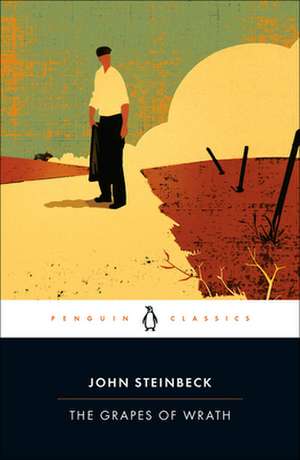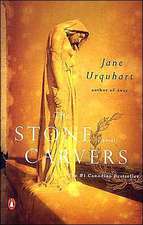The Grapes of Wrath: Penguin Classics
Autor John Steinbeck Robert DeMotten Limba Engleză Hardback – 31 dec 1752 – vârsta de la 14 până la 18 ani
Vezi toate premiile Carte premiată
Audies (1999)
| Toate formatele și edițiile | Preț | Express |
|---|---|---|
| Paperback (3) | 106.40 lei 3-5 săpt. | |
| Penguin Books – 28 feb 2006 | 106.40 lei 3-5 săpt. | |
| Penguin Books – 31 dec 2001 | 119.82 lei 3-5 săpt. | |
| Penguin Books – 30 iun 1997 | 189.75 lei 3-5 săpt. | |
| Hardback (4) | 96.43 lei 24-35 zile | |
| EVERYMAN – 17 mar 1993 | 96.43 lei 24-35 zile | |
| Bloomsbury Publishing – 31 dec 1752 | 213.54 lei 3-5 săpt. | |
| Gale Cengage – 30 iun 2008 | 228.69 lei 3-5 săpt. | |
| Chelsea House Publications – 31 aug 2006 | 421.26 lei 38-50 zile |
Din seria Penguin Classics
-
 Preț: 81.00 lei
Preț: 81.00 lei -
 Preț: 101.03 lei
Preț: 101.03 lei -
 Preț: 93.05 lei
Preț: 93.05 lei -
 Preț: 98.52 lei
Preț: 98.52 lei -
 Preț: 112.53 lei
Preț: 112.53 lei -
 Preț: 101.43 lei
Preț: 101.43 lei -
 Preț: 78.80 lei
Preț: 78.80 lei -
 Preț: 75.00 lei
Preț: 75.00 lei -
 Preț: 98.77 lei
Preț: 98.77 lei -
 Preț: 66.75 lei
Preț: 66.75 lei -
 Preț: 117.58 lei
Preț: 117.58 lei -
 Preț: 93.35 lei
Preț: 93.35 lei -
 Preț: 63.29 lei
Preț: 63.29 lei -
 Preț: 72.96 lei
Preț: 72.96 lei -
 Preț: 87.49 lei
Preț: 87.49 lei -
 Preț: 99.11 lei
Preț: 99.11 lei -
 Preț: 130.90 lei
Preț: 130.90 lei -
 Preț: 75.58 lei
Preț: 75.58 lei -
 Preț: 108.89 lei
Preț: 108.89 lei -
 Preț: 86.09 lei
Preț: 86.09 lei -
 Preț: 79.66 lei
Preț: 79.66 lei -
 Preț: 77.16 lei
Preț: 77.16 lei -
 Preț: 132.51 lei
Preț: 132.51 lei -
 Preț: 90.51 lei
Preț: 90.51 lei -
 Preț: 93.35 lei
Preț: 93.35 lei -
 Preț: 87.37 lei
Preț: 87.37 lei -
 Preț: 100.13 lei
Preț: 100.13 lei -
 Preț: 108.28 lei
Preț: 108.28 lei -
 Preț: 117.11 lei
Preț: 117.11 lei -
 Preț: 92.25 lei
Preț: 92.25 lei -
 Preț: 81.49 lei
Preț: 81.49 lei -
 Preț: 63.00 lei
Preț: 63.00 lei -
 Preț: 106.40 lei
Preț: 106.40 lei -
 Preț: 74.59 lei
Preț: 74.59 lei -
 Preț: 94.66 lei
Preț: 94.66 lei -
 Preț: 88.29 lei
Preț: 88.29 lei -
 Preț: 111.47 lei
Preț: 111.47 lei -
 Preț: 98.77 lei
Preț: 98.77 lei -
 Preț: 73.63 lei
Preț: 73.63 lei -
 Preț: 130.05 lei
Preț: 130.05 lei -
 Preț: 86.38 lei
Preț: 86.38 lei -
 Preț: 91.84 lei
Preț: 91.84 lei -
 Preț: 133.27 lei
Preț: 133.27 lei -
 Preț: 93.68 lei
Preț: 93.68 lei -
 Preț: 98.07 lei
Preț: 98.07 lei -
 Preț: 103.80 lei
Preț: 103.80 lei -
 Preț: 110.45 lei
Preț: 110.45 lei -
 Preț: 94.66 lei
Preț: 94.66 lei -
 Preț: 89.20 lei
Preț: 89.20 lei -
 Preț: 86.26 lei
Preț: 86.26 lei
Preț: 213.54 lei
Nou
Puncte Express: 320
Preț estimativ în valută:
40.87€ • 42.48$ • 33.86£
40.87€ • 42.48$ • 33.86£
Carte disponibilă
Livrare economică 14-28 ianuarie 25
Preluare comenzi: 021 569.72.76
Specificații
ISBN-13: 9781417747818
ISBN-10: 1417747811
Pagini: 464
Dimensiuni: 127 x 193 x 30 mm
Greutate: 0.43 kg
Ediția:Turtleback Scho
Editura: Bloomsbury Publishing
Seria Penguin Classics
ISBN-10: 1417747811
Pagini: 464
Dimensiuni: 127 x 193 x 30 mm
Greutate: 0.43 kg
Ediția:Turtleback Scho
Editura: Bloomsbury Publishing
Seria Penguin Classics
Descriere
Now available in a Penguin Classics edition, Steinbeck's classic comes with a completely revised Introduction and, for the first time, detailed notes by leading Steinbeck scholar Robert DeMott.
Recenzii
“Steinbeck is a poet. . . . Everything is real, everything perfect.” —Upton Sinclair, Common Sense
“I think, and with earnest and honest consideration . . . that The Grapes of Wrath is the greatest American novel I have ever read." — Dorothy Parker
“It seems to me as great a book as has yet come out of America.” —Alexander Woollcott
“I think, and with earnest and honest consideration . . . that The Grapes of Wrath is the greatest American novel I have ever read." — Dorothy Parker
“It seems to me as great a book as has yet come out of America.” —Alexander Woollcott
Notă biografică
John Steinbeck, born in Salinas, California, in 1902, grew up in a fertile agricultural valley, about twenty-five miles from the Pacific Coast. Both the valley and the coast would serve as settings for some of his best fiction. In 1919 he went to Stanford University, where he intermittently enrolled in literature and writing courses until he left in 1925 without taking a degree. During the next five years he supported himself as a laborer and journalist in New York City, all the time working on his first novel, Cup of Gold (1929). After marriage and a move to Pacific Grove, he published two California books, The Pastures of Heaven (1932) and To a God Unknown (1933), and worked on short stories later collected in The Long Valley (1938). Popular success and financial security came only with Tortilla Flat (1935), stories about Monterey’s paisanos. A ceaseless experimenter throughout his career, Steinbeck changed courses regularly. Three powerful novels of the late 1930s focused on the California laboring class: In Dubious Battle (1936), Of Mice and Men (1937), and the book considered by many his finest, The Grapes of Wrath (1939). The Grapes of Wrath won both the National Book Award and the Pulitzer Prize in 1939.
Early in the 1940s, Steinbeck became a filmmaker with The Forgotten Village (1941) and a serious student of marine biology with Sea of Cortez (1941). He devoted his services to the war, writing Bombs Away (1942) and the controversial play-novelette The Moon is Down (1942). Cannery Row (1945), The Wayward Bus (1948), another experimental drama, Burning Bright (1950), and The Log from the Sea of Cortez (1951) preceded publication of the monumental East of Eden (1952), an ambitious saga of the Salinas Valley and his own family’s history.
The last decades of his life were spent in New York City and Sag Harbor with his third wife, with whom he traveled widely. Later books include Sweet Thursday (1954), The Short Reign of Pippin IV: A Fabrication (1957), Once There Was a War (1958), The Winter of Our Discontent (1961), Travels with Charley in Search of America (1962), America and Americans (1966), and the posthumously published Journal of a Novel: The East of Eden Letters (1969), Viva Zapata! (1975), The Acts of King Arthur and His Noble Knights (1976), and Working Days: The Journals of The Grapes of Wrath (1989).
Steinbeck received the Nobel Prize in Literature in 1962, and, in 1964, he was presented with the United States Medal of Freedom by President Lyndon B. Johnson. Steinbeck died in New York in 1968. Today, more than thirty years after his death, he remains one of America's greatest writers and cultural figures.
Robert DeMott, editor, is the Edwin and Ruth Kennedy Distinguished Professor at Ohio State University and author of Steinbeck's Typewriter, an award-winning book of critical essays.
Early in the 1940s, Steinbeck became a filmmaker with The Forgotten Village (1941) and a serious student of marine biology with Sea of Cortez (1941). He devoted his services to the war, writing Bombs Away (1942) and the controversial play-novelette The Moon is Down (1942). Cannery Row (1945), The Wayward Bus (1948), another experimental drama, Burning Bright (1950), and The Log from the Sea of Cortez (1951) preceded publication of the monumental East of Eden (1952), an ambitious saga of the Salinas Valley and his own family’s history.
The last decades of his life were spent in New York City and Sag Harbor with his third wife, with whom he traveled widely. Later books include Sweet Thursday (1954), The Short Reign of Pippin IV: A Fabrication (1957), Once There Was a War (1958), The Winter of Our Discontent (1961), Travels with Charley in Search of America (1962), America and Americans (1966), and the posthumously published Journal of a Novel: The East of Eden Letters (1969), Viva Zapata! (1975), The Acts of King Arthur and His Noble Knights (1976), and Working Days: The Journals of The Grapes of Wrath (1989).
Steinbeck received the Nobel Prize in Literature in 1962, and, in 1964, he was presented with the United States Medal of Freedom by President Lyndon B. Johnson. Steinbeck died in New York in 1968. Today, more than thirty years after his death, he remains one of America's greatest writers and cultural figures.
Robert DeMott, editor, is the Edwin and Ruth Kennedy Distinguished Professor at Ohio State University and author of Steinbeck's Typewriter, an award-winning book of critical essays.
Cuprins
The Grapes of Wrath Editor's Preface to the Second Edition
Chronology
A Note on the Text
I. The Grapes of Wrath: The Text
Map of the Joads' JourneyII. The Social Context
Frank J. Taylor, California's Grapes of Wrath
Carey McWilliams, California Pastoral
Martin Shockley, The Reception of The Grapes of Wrath in Oklahoma
III. The Creative Context
Jackson J. Benson, The Background to the Composition of The Grapes of Wrath
Robert DeMott, "Working Days and Hours": Steinbeck's Writing of The Grapes of Wrath
John Steinbeck, Suggestion for an Interview with Joseph Henry Jackson
IV. Criticism
Editors' Introduction: The Pattern of Criticism
Frederic I. Carpenter, The Philosophical Joads
Peter Lisca, The Grapes of Wrath as Fiction
Robert J. Griffin and William A. Freedman, Machines and Animals: Pervasive Motifs in The Grapes of Wrath
John R. Reed, The Grapes of Wrath and the Esthetics of Indigence
Patrick W. Shaw, Tom's Other Trip: Psycho-Physical Questing in The Grapes of Wrath
John J. Conder, Steinbeck and Nature's Self: The Grapes of Wrath
Louis Owens, The American Joads
John Ditsky, The Ending of The Grapes of Wrath: A Further Commentary
Nellie Y. McKay, From "Happy [?]-Wife-and-Motherdom": The Portrayal of Ma Joad in John Steinbeck's The Grapes of Wrath
Mimi Reisel Gladstein, The Grapes of Wrath: Steinbeck and the Eternal Immigrant
Topics for Discussion and Papers
Bibliography
Chronology
A Note on the Text
I. The Grapes of Wrath: The Text
Map of the Joads' JourneyII. The Social Context
Frank J. Taylor, California's Grapes of Wrath
Carey McWilliams, California Pastoral
Martin Shockley, The Reception of The Grapes of Wrath in Oklahoma
III. The Creative Context
Jackson J. Benson, The Background to the Composition of The Grapes of Wrath
Robert DeMott, "Working Days and Hours": Steinbeck's Writing of The Grapes of Wrath
John Steinbeck, Suggestion for an Interview with Joseph Henry Jackson
IV. Criticism
Editors' Introduction: The Pattern of Criticism
Frederic I. Carpenter, The Philosophical Joads
Peter Lisca, The Grapes of Wrath as Fiction
Robert J. Griffin and William A. Freedman, Machines and Animals: Pervasive Motifs in The Grapes of Wrath
John R. Reed, The Grapes of Wrath and the Esthetics of Indigence
Patrick W. Shaw, Tom's Other Trip: Psycho-Physical Questing in The Grapes of Wrath
John J. Conder, Steinbeck and Nature's Self: The Grapes of Wrath
Louis Owens, The American Joads
John Ditsky, The Ending of The Grapes of Wrath: A Further Commentary
Nellie Y. McKay, From "Happy [?]-Wife-and-Motherdom": The Portrayal of Ma Joad in John Steinbeck's The Grapes of Wrath
Mimi Reisel Gladstein, The Grapes of Wrath: Steinbeck and the Eternal Immigrant
Topics for Discussion and Papers
Bibliography
Textul de pe ultima copertă
John Steinbeck's Pulitzer Prize--winning epic of the Great Depression follows the western movement of one family and a nation in search of work and human dignity.
Premii
- Audies Winner, 1999
















